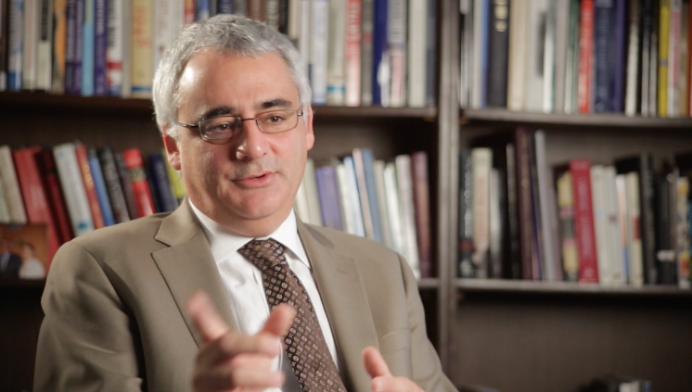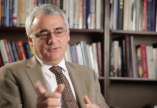Charles Asher Small is the founding director of the Institute for the Study of Global Antisemitism and Policy (ISGAP). Â
Antisemitic notions of Judaism and Jewish identity have often been shaped—and even imposed—by external forces through persecution, marginalisation, segregation, and, at times, assimilation. In the contemporary context, a hostile redefinition of Jewish identity is increasingly permeating academic and intellectual spheres and paradigms, particularly in elite academic institutions. This redefinition is casting the Jewish people as agents of colonialism, occupation, white privilege, racism, oppression, and apartheid, devoid of any attempt to engage Jewish thought, values, notions of homeland, exile, freedom, or history.
This shift, and the increase in its appeal, is fueled partly by the global economic crisis, in which states are failing, a migration crisis ensues, and an increase in economic, political and cultural marginalisation in core and prereferral nations is taking place at an alarming rate. It is in this context of dislocation and fear, that social movements emerge that attack the democratic centre, with radical ideologies, from both left and right extremists, as well as Jihadist Islamists with ideological roots in the Muslim Brotherhood, influencing both Sunni and Shite societies, and is a foundational element of the red-green alliance, impactful especially in Western higher education. These three radical social movements, although different in political orientation, share notions of genocidal antisemitism as a core element of their ideologies and engage intensely in redefining Jewish identity and Jewish culture for their own political expediency. In fact, this antisemitism often becomes the fuel to energise and encourages the masses.
Antisemitic racist representations, be they of Semites polluting the purity of the white race and the Aryan nation or of modern Jews as white racists, settlers, and occupiers, are designed by antisemitic discourse to empty Jewishness of any significant meaning and attempt to detach Jewish wisdom, knowledge, ideas, and culture from Jewish identity in ways that require a profound and urgent rethinking. Acceptance of this racial or ethnic paradigm makes it difficult, if impossible, to assert one’s Jewish identity and one’s connection to the Jewish homeland—both intellectual and geographical—and notions of freedom which predate the current distortions that are designed to delegitimise the very essence of who the Jewish people are.
Just two generations ago, leading intellectuals in Nazi Europe—philosophers, biologists, and eugenicists, as well as theologians—defined the Jewish people as non-white, as an enemy that threatened the purity of the Aryan race. This racist antisemitism ultimately led to the Shoah, the systematic extermination of more than six million Jews, the majority of whom were of Ashkenazic descent. Incredibly, within the feeble imagination and gaze of the contemporary antisemite, the Ashkenazi Jew is defined as white and privileged. Now, less than 80 years later, the so-called intellectuals of our generation have the audacity to redefine the Jewish people as white racists, colonisers, supporters of apartheid, and occupiers, as the greatest contemporary enemy of all that is good and decent, despite the catastrophe instigated by their racist intellectual predecessors not only against the Jewish people but against Europe as a whole. This is carried out at top universities and in books published by top publishing houses without even the pretence of exploring the Jewish worldview rich in wisdom and thought that has been established for thousands of years.
One potential response to this dangerous and hateful distortion, which is currently gaining traction, can be found in a new model of ‘Jewish Consciousness’ that is being developed in a cutting-edge research project at the Institute for the Study of Global Antisemitism and Policy (ISGAP). Drawing on Jewish teachings and wisdom, as well as on parallels to the Black Consciousness Movement in apartheid South Africa, which was led by Steve Biko, Jewish Consciousness can serve as a basis for reclaiming Jewish identity from the current imposed distortions and as an effective tool for combating antisemitism and prejudice in general.
Black Consciousness empowered Black South Africans to reclaim their identity from the imposed racist categorisations of European colonialism, which relied on questionable philosophical, theological, and military theories to create a hierarchy of superior and inferior races that permeated all levels of society. Black Consciousness was grounded in the dignity and wisdom of ancient African culture and heritage. In much the same way, in the face of contemporary challenges, Jewish Consciousness can serve as a call for the reclamation of Jewish identity: one based on historical depth, ethical philosophy, and the unique contributions of Jewish thought rather than the imposed definitions of modern political discourse. This proud and deep foundation can be used to fight contemporary antisemitism and reject the superficial use of identity politics to justify the elimination of Israel and even the Jewish people themselves.
Like African identities, Jewish identity is far more complex than the binary categories of race and ethnicity and the dualistic power dynamics that are so often applied today, which are deeply rooted in society based on European constructed notions of identity. At its core, Jewish notions of belonging and otherness are shaped by millennia of rich intellectual and spiritual traditions. From the teachings of the Torah and the Talmud to the philosophical inquiries of Maimonides and other intellectual giants, Jewish thought has long wrestled with questions of morality, ethics, justice, and human responsibility. Key ideas like Tzelem Elokim—the revolutionary radical notion that all humans are created in the image of God—reflect a view of human dignity and ethical obligation that transcends the simplistic labels applied and batted about in contemporary academia. Jewish principles emphasise universalism, compassion, and the inherent value of every individual, resisting the superficial frameworks imposed by modern political ideologies.
The ethical and philosophical dimensions of Jewish thought and identity are not reducible to race, colonialism, occupation, or privilege, as willfully ignorant academics and so-called experts in the media of record and increasingly in the institutions of governance would have us believe. Rather, they are part of a long-standing intellectual tradition that has influenced global thought, law, and ethics for thousands of years. Emmanuel Levinas, for example, a Jewish philosopher who brought Jewish thought into Western universities, framed Jewish ethics around notions of belonging and otherness, specifically the imperative of recognising and responding to the humanity of the ‘Other,’ a concept deeply embedded in Jewish ethics and legal thought. This ethical framework defies the rigid power dynamics and identity politics that now threaten to define Jewishness in purely negative terms. Levinas also argued, based on Jewish ethics, that any social movement or philosophical argument that does not see the ‘Other’ as human should be resisted and neither engaged in nor compromised with.
Yet, on university campuses and in other intellectual circles, a more insidious form of antisemitism is emerging, one that paints Jews as the embodiment of white privilege, colonialism, and global oppression. This narrative has taken hold particularly in progressive spaces, where Jews—despite their long history of persecution—are increasingly viewed as part of an oppressor class. This intellectual hostility calls for a proactive assertion of Jewish identity, one that embraces the full scope of Jewish history, ethical traditions, and spiritual teachings, rather than allowing Jewish identity to be dictated by political ideologies that seek to erase or distort Jewish experiences. As we have seen over the past year, these twisted ideas, masquerading as scholarship at some of our most elite universities, travel from the classroom to the encampments, where Jews are physically and verbally attacked, and from there to the streets of our cities. In keeping with a colonial mentality, this occurs without attempts to engage or understand a Jewish worldview, which is presented in a superficial and ignorant manner.
Jewish Consciousness can serve as a vital intellectual movement, countering this growing wave of academic, intellectual, political, and social distortion. By grounding itself in the profound ethical and intellectual traditions of Judaism, it can reject the binary frameworks of race and power politics that are increasingly dominant in modern discourse. Jewish identity, historically defined by resilience, justice, and a commitment to moral responsibility, can only be fully understood on its own terms, rather than as a mere reaction to external pressures. This approach can give young Jewish people the power to stand up for themselves, while gaining a deeper understanding of Judaism’s great traditions and how to combat this oldest of hatreds, outside the paradigms being imposed by foreign concepts with malevolent intent.
In this sense, Jewish Consciousness can mirror the success of Black Consciousness, which was not just a movement of political rebellion but also launched a psychological, intellectual, and cultural revolution that empowered Black South Africans to reject the racist categories of their oppressors and reclaim their heritage and identity. Similarly, Jewish Consciousness enables Jews, especially within academia,  to resist the reductionist and racialised frameworks being imposed on them today, which are designed to weaken and destroy their identity, instil shame, create a disconnect from their wisdom and the land, and take great pride in one of the great decolonisation projects ever, the establishment of the State of Israel.  In fact, the emerging dominant intellectual discourse, inspired by Edward Said and his disciples, invokes a modern variation of the Christian antisemitic trope of replacement theology, in which the Jewish claim to the land is to be replaced by a new covenant.  Jewish Consciousness empowers them to reclaim this identity through the lens of their own vast intellectual, cultural, and ethical heritage steeped in profound wisdom.
The increasing conflation of Jewish identity with the antisemitic dynamics of white privilege, occupation, and colonialism fundamentally misrepresents the Jewish historical experience. Jewish identity has been shaped by centuries of displacement, statelessness, and a constant negotiation with dominant cultures. The ethical and theological concepts that underpin Judaism speak to a universal human dignity and moral responsibility, not the crude power dynamics now being projected onto Jewish students and scholars in the classrooms of elite universities, its reactionary encampments, in the media of record, and increasingly throughout society.
Ultimately, the Jewish people must be able to reject the labels imposed on them by external ideologies. Instead, they should be empowered to ground their identity in the rich, ethical, and intellectual traditions that have sustained them for millennia—and then to act from a position of strength, pride, and confidence. The idea of Jewish Consciousness is therefore not merely a response to antisemitism—it is a proactive affirmation of Jewish dignity, history, and ethical responsibility. By embracing this sense of identity, Jews can reclaim their place as a people defined not by oppression or privilege but by their contributions to humanity, justice, and moral philosophy.
This paradigm also creates a powerful area of common ground for Jewish people and people of African descent to reinvigorate and renew their historically powerful alliance, which is rooted in the ethics of justice, in the pursuit of respect and dignity for all people. Such an alliance, where African, Black and Jewish culture, knowledge, experience, wisdom, and humanity come together and reinforce each other, can contribute some much-needed light in this hour of darkness for all humanity.



































